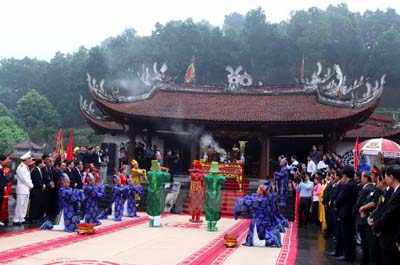Rituals were held in northern Phu Tho Province on April 24 (the sixth day of the third lunar month) to commemorate the death anniversary of the nation’s Great Father Lac Long Quan and pay incense tribute to Great Mother Au Co.

At the Temple of Lac Long Quan, provincial leaders burned incense and offered flowers and offerings as an expression of gratitude to the person believed to be the Great Father of the Vietnamese nation.
They prayed, on the behalf of the whole nation, for peace and prosperity for the homeland and promised to together work hard to develop the country and protect it for the next generations.
On the same day, the officials also paid homage to Great Mother Au Co at her Temple, which, together with the Lac Long Quan temple, are located in the relic site of Hung Kings Temple.
Vietnamese legend has it that Lac Long Quan, son of Kinh Duong Vuong, married Au Co, a daughter of King De Lai. Au Co gave birth to a sack containing 100 eggs from which 100 children were born.
The couple then decided to separate in order to populate the land and propagate the race, so half the children followed their mother to the highlands and the remaining went with their father to the sea.
The first child went with mother Au Co to Phong Chau, now Phu Tho Province. He then became King Hung and founded the first nation in the history of Viet Nam, called Van Lang.
Ruling the country over 18 generations, the Hung Kings taught the people how to grow wet rice. They chose Nghia Linh Mountain, the highest in the region, to perform rituals devoted to rice and sun deities to pray for lush crops.
To honour the great contributions of the Hung Kings, a complex of temples dedicated to them was built on Nghia Linh Mountain, and the tenth day of the third lunar month serves as the national commemorative anniversary.
The worshipping rituals of the Hung Kings are closely related to the ancestral worshipping tradition of most Vietnamese families which forms an important part of people's spiritual lives. It was recognised as a UNESCO Intangible Cultural Heritage of Humanity in 2012.